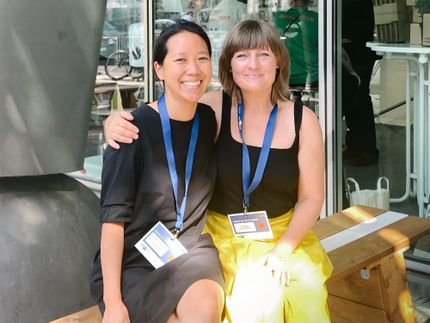Ground-breaking ceremony for Europe's only innovation forge in Berlin
Europe's largest laboratory infrastructure for transfer and pre-foundation teams in green chemistry is being created
Advertisement
The Chemical Invention Factory (CIF) is Europe's largest laboratory infrastructure for transfer and pre-foundation teams in green chemistry. It will make a significant contribution to further advancing the transfer of innovations from science to green applications in the field of materials chemistry. The CIF is financed with funds from TU Berlin (approx. 13 million euros) and the state of Berlin (approx. seven million euros) and is to be built on the Charlottenburg campus of TU Berlin on Marchstraße by 2027.
Green chemistry is the future because it promotes sustainable processes and materials that reduce environmental pollution and conserve resources. As one of the leading research and innovation locations in Europe, Berlin plays an important role here. Universities, start-ups and industrial partners are working together here on environmentally friendly technologies.
Dr. Ina Czyborra, Senator for Science, Health and Care of the State of Berlin, Prof. Dr. Geraldine Rauch, President of Technische Universität Berlin, Prof. Dr. John Warner, namesake of the CIF, honorary professor at TU Berlin and founder of the twelve principles of green chemistry, and other participants gave the starting signal for the CIF on 24 September 2025 with a joint groundbreaking ceremony.
Space for twelve top-class pre-founding teams from all over the world
Up to twelve teams from all over the world will develop their research results into marketable products in the CIF in order to transform chemistry into a sustainable circular economy based on renewable raw materials. They will be integrated into the Berlin innovation ecosystem greenCHEM. With 39 so-called fume cupboards for chemical laboratory work, the CIF building will be the largest of its kind in Europe for the transfer of scientific findings from green chemistry to application. The approximately 1,000 square meters of floor space will also feature state-of-the-art analytical equipment such as high-performance liquid chromatographs and gas chromatography-mass spectrometers, which all teams will be able to access together. The laboratory areas for each team, which also include meeting rooms, are secured to ensure the protection of intellectual property. On the first floor there will be a café, space for exchange and meeting, as well as a demolab that tests systems on the next larger scale behind a pane of glass.
Free infrastructure for pre-seed start-ups with complex topics
Dr. Ina Czyborra, Senator for Science, Health and Care of the State of Berlin, explains: "With a turnover of over 200 billion euros, Germany has the third largest chemical industry in the world. To keep it that way, it is becoming increasingly important that start-ups in this sector also receive targeted support in making their innovations marketable. That is why the state of Berlin is creating new instruments and structures to facilitate the transfer of research results into application - for example with the Pre-Seed Fund, which is intended to specifically promote deep-tech start-ups, or UNITE, the newly created innovation and start-up center in the capital region. I am delighted that with the Chemical Invention Factory, Berlin now also has an infrastructure that supports spin-offs in the complex field of chemistry free of charge for two to four years. I am sure that this will further strengthen the attractiveness of our science location for national and international talent and that we will come a good deal closer to our goal of establishing Berlin as a center for green chemistry."
Research and teaching in Berlin also benefit from the CIF
Prof. Dr. Geraldine Rauch, President of Technische Universität Berlin, adds: "The chemical industry is responsible for four percent of greenhouse gas emissions worldwide. Only innovations can reduce this figure and at the same time advance the transition to a chemistry that is not based on crude oil. Our university's focus on turning scientific results into social benefits and our research strength in chemistry are an incentive for us to lead the way here. The Chemical Invention Factory is based on an initiative of our UniSysCat Cluster of Excellence in Catalysis. At the same time, we are deliberately opening up the CIF to the entire Berlin University Alliance (BUA): each funded team is assigned a professor who accompanies the project as 'InnoDirector' and is available as a mentor. This person can come from any of the three Berlin universities and ensures that research and teaching in the capital also benefit from the CIF."
70 percent of the required technologies have not yet been invented
Prof. Dr. John Warner, namesake of the CIF, honorary professor at TU Berlin and founder of the twelve principles of green chemistry, says: "Around 70 percent of the technologies required for the transformation of chemistry have not yet been invented. Catalysts play a central role in this, as they are used in more than 80 percent of chemical reactions in industry. This is why the opportunity for start-ups in the CIF to exchange ideas with the catalysis experts at TU Berlin is so ideal."
Transfer teams are integrated into the Berlin innovation ecosystem greenCHEM
Martin Rahmel, Director of the Chemical Invention Factory at TU Berlin, explains: "The special feature of the CIF is that the supported teams are automatically integrated into the Berlin innovation ecosystem greenCHEM. This is funded by the Federal Ministry of Education and Research as part of the 'T!Raum - TransferRäume für die Zukunft von Regionen' program and brings together chemical companies in Berlin and Brandenburg as well as universities, non-university scientific institutions and authorities with the start-ups. This not only results in a 'push' of innovations through new ideas from research, but also a 'pull' through concrete material challenges faced by users. Through this combination, innovations from Berlin will support the enormous transformation task facing the chemical industry."
Note: This article has been translated using a computer system without human intervention. LUMITOS offers these automatic translations to present a wider range of current news. Since this article has been translated with automatic translation, it is possible that it contains errors in vocabulary, syntax or grammar. The original article in German can be found here.
Other news from the department business & finance
Most read news
More news from our other portals
Something is happening in the chemical industry ...
This is what true pioneering spirit looks like: Plenty of innovative start-ups are bringing fresh ideas, lifeblood and entrepreneurial spirit to change tomorrow's world for the better. Immerse yourself in the world of these young companies and take the opportunity to get in touch with the founders.


































































